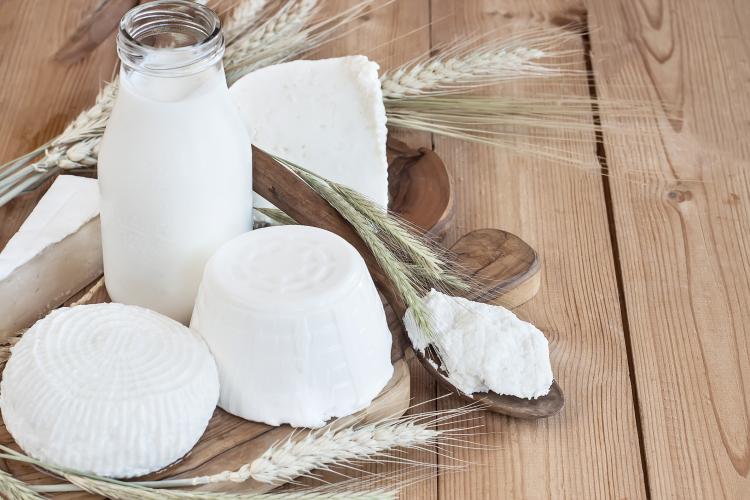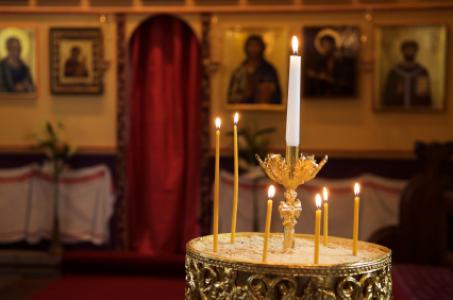
Best Comet of 2025?
C/2024 G3 (ATLAS) has already become very faintly visible to the naked eye for observers in the Southern Hemisphere.
Shavuot, also called the Festival of Weeks, is one of three major Jewish holidays related to harvest and agriculture. Jews in the United Kingdom celebrate the day with prayers and Torah studies—and cheesecake.

Dairy is on the menu for Shavuot.
©iStockphoto.com/Karaidel
Shavuot is celebrated on the 6th day of Sivan, the third month of the Jewish calendar. The date falls into May or June in the Gregorian calendar.
No, Shavuot is not a bank holiday in the UK, so businesses, shops, and organizations usually follow regular hours.
On Shavuot, Jewish people celebrate the Torah and thank God for handing it down to them. Synagogues across the United Kingdom are decorated with flowers and plants. They are meant to symbolize the flora of Mount Sinai where, according to Jewish holy scripture, Moses was presented with the Torah.
Some people stay awake all night to study the Torah. According to lore, the Jews who had traveled to Mount Sinai to receive the Torah were still sleeping when God appeared. This behavior is considered a particularly shameful part of Jewish history. So, by studying the Torah all night, Jewish people attempt to show God their appreciation for handing it down to them.
The festive Shavuot meal is all about dairy foods. Recipes for the Shavuot menu include cheese blintzes (thin pancakes with cheese) or flatbread, creamy pasta, polenta, soups, cheese salads, cheesecakes, and ice cream.
However, Shavuot is one of the six Jewish holidays known as Yom Tov, and on these occasions, Jews celebrate by eating meat. Jews who are kosher, meaning they follow the religious laws for eating and preparing food, wait a while between eating dairy and meat products. Many Jews, therefore, have two meals on Shavuot. They first eat dairy, and, after waiting the required time, they sit down again to eat meat or fish.
Shavuot commemorates the moment when the Israelites received the Torah at Mount Sinai, an event which carries great significance for people of Jewish faith. Similar in terms of its religious motive and significance, the holiday is considered to be related to the Christian Pentecost celebration.
The timing of the holiday is related to agriculture: In Jewish culture, it traditionally marks the end of the barley harvest and the start of the wheat harvest. Because it is celebrated 7 weeks after Passover, another Jewish holiday with agricultural roots, it is also called the Festival of Weeks, the Feast of Weeks, or the Feast of the Harvest. In fact, Shavuot is the Hebrew word for weeks.
The United Kingdom is estimated to have the 5th largest Jewish population in the world, with just under 300,000 people practicing the Jewish faith in the country.
By far the largest British Jewish community is found in London, followed by those in Manchester and Leeds.
Jewish settlement in England can be traced as far back as the time of the Norman Conquest in 1066. The Jewish community outnumbered the Spanish and Portuguese communities in England by the 18th century.
Many Jewish families in Eastern Europe moved to England to escape persecution and hardship between 1881 and 1914. About 150,000 Jewish people settled in England during that time, with large numbers in London's East End. England continued to receive Jewish immigrants escaping persecution around the time of World War II (1939-1945).
In the Jewish diaspora—Jewish communities outside of Israel—an extra day is usually added to religious observances, with the exception of Yom Kippur, which lasts only one day worldwide, and Rosh Hashana, which is celebrated over two days in both Israel and the diaspora.
This custom has its roots in ancient times when the beginning of the months in the Jewish calendar still relied on the sighting of the crescent Moon following a New Moon.
The beginning of a new month was determined by the Sanhedrin, the supreme court of ancient Israel in Jerusalem. Once the date was published, messengers were dispatched to spread the news among Jews living abroad. Since this process took some time, it was decreed that Jews outside of ancient Israel were to observe every holiday for 2 days to make sure that the rules and customs applicable to each holiday were observed on the proper date. This rule is still observed today.
Note: Jewish holidays begin at sundown the day before the date specified for the holiday.
| Year | Weekday | Date | Name | Holiday Type |
|---|---|---|---|---|
| 2020 | 金曜日 | 5月29日 (金) | Shavuot | Jewish Holiday |
| 2021 | 月曜日 | 5月17日 (月) | Shavuot | Jewish Holiday |
| 2022 | 日曜日 | 6月5日 (日) | Shavuot | Jewish Holiday |
| 2023 | 金曜日 | 5月26日 (金) | Shavuot | Jewish Holiday |
| 2024 | 水曜日 | 6月12日 (水) | Shavuot | Jewish Holiday |
| 2025 | 月曜日 | 6月2日 (月) | Shavuot | Jewish Holiday |
| 2026 | 金曜日 | 5月22日 (金) | Shavuot | Jewish Holiday |
| 2027 | 金曜日 | 6月11日 (金) | Shavuot | Jewish Holiday |
| 2028 | 水曜日 | 5月31日 (水) | Shavuot | Jewish Holiday |
| 2029 | 日曜日 | 5月20日 (日) | Shavuot | Jewish Holiday |
| 2030 | 金曜日 | 6月7日 (金) | Shavuot | Jewish Holiday |
While we diligently research and update our holiday dates, some of the information in the table above may be preliminary. If you find an error, please let us know.

C/2024 G3 (ATLAS) has already become very faintly visible to the naked eye for observers in the Southern Hemisphere.

Orthodox Christians in the United Kingdom mark the start of a new calendar year on either January 1 or 14 in the Gregorian calendar.

Burns Night celebrates the life and work of Robert Burns and Scottish culture in general. It is on or around January 25 each year.

Isra and Mi'raj marks the night when the Prophet Mohammad traveled from Mecca to Jerusalem, ascended to heaven, and returned.